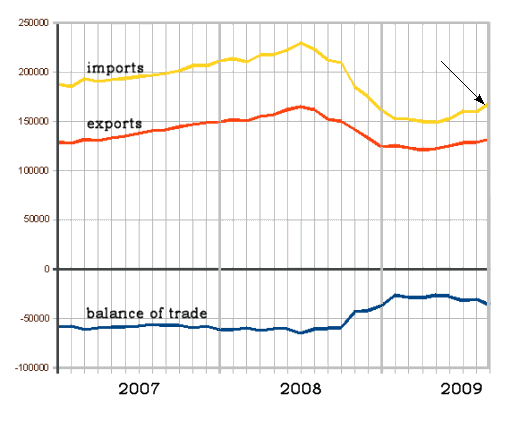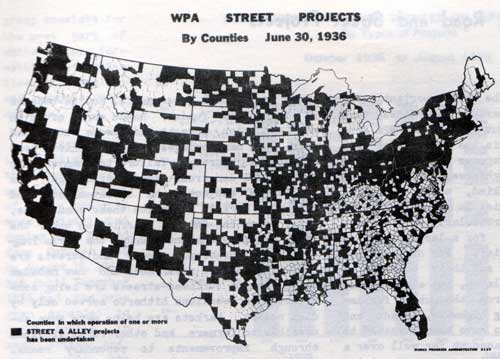 Some things are just too big to ponder. Macroeconomics is on the top of my list right now, even above ‘black holes’ [though I’m beginning to think they’re related]. This is the Balance of Trade graph – how much we export and how much we import. With the financial crisis, both fell [good]. Imports particularly fell decreasing the ‘trade gap’ [even better]. But now, things have improved some and people are beginning to buy again [not totally good?]. But unemployment is still soaring while the trade gap is beginning to worsen again [very not good at all]. What’s that got to do with the price of tea in China? A lot according to Paul Krugman…
Some things are just too big to ponder. Macroeconomics is on the top of my list right now, even above ‘black holes’ [though I’m beginning to think they’re related]. This is the Balance of Trade graph – how much we export and how much we import. With the financial crisis, both fell [good]. Imports particularly fell decreasing the ‘trade gap’ [even better]. But now, things have improved some and people are beginning to buy again [not totally good?]. But unemployment is still soaring while the trade gap is beginning to worsen again [very not good at all]. What’s that got to do with the price of tea in China? A lot according to Paul Krugman…

International travel by world leaders is mainly about making symbolic gestures. Nobody expects President Obama to come back from China with major new agreements, on economic policy or anything else. But let’s hope that when the cameras aren’t rolling Mr. Obama and his hosts engage in some frank talk about currency policy. For the problem of international trade imbalances is about to get substantially worse. And there’s a potentially ugly confrontation looming unless China mends its ways…
Despite huge trade surpluses and the desire of many investors to buy into this fast-growing economy — forces that should have strengthened the renminbi, China’s currency — Chinese authorities have kept that currency persistently weak. They’ve done this mainly by trading renminbi for dollars, which they have accumulated in vast quantities. And in recent months China has carried out what amounts to a beggar-thy-neighbor devaluation, keeping the yuan-dollar exchange rate fixed even as the dollar has fallen sharply against other major currencies. This has given Chinese exporters a growing competitive advantage over their rivals, especially producers in other developing countries.
What makes China’s currency policy especially problematic is the depressed state of the world economy. Cheap money and fiscal stimulus seem to have averted a second Great Depression. But policy makers haven’t been able to generate enough spending, public or private, to make progress against mass unemployment. And China’s weak-currency policy exacerbates the problem, in effect siphoning much-needed demand away from the rest of the world into the pockets of artificially competitive Chinese exporters.
But why do I say that this problem is about to get much worse? Because for the past year the true scale of the China problem has been masked by temporary factors. Looking forward, we can expect to see both China’s trade surplus and America’s trade deficit surge. That, at any rate, is the argument made in a new paper by Richard Baldwin and Daria Taglioni of the Graduate Institute, Geneva. As they note, trade imbalances, both China’s surplus and America’s deficit, have recently been much smaller than they were a few years ago. But, they argue, “these global imbalance improvements are mostly illusory — the transitory side effect of the greatest trade collapse the world has ever seen”…
But with the financial crisis abating, this process is going into reverse. Last week’s U.S. trade report showed a sharp increase in the trade deficit between August and September. And there will be many more reports along those lines. So picture this: month after month of headlines juxtaposing soaring U.S. trade deficits and Chinese trade surpluses with the suffering of unemployed American workers. If I were the Chinese government, I’d be really worried about that prospect.
Unfortunately, the Chinese don’t seem to get it: rather than face up to the need to change their currency policy, they’ve taken to lecturing the United States, telling us to raise interest rates and curb fiscal deficits — that is, to make our unemployment problem even worse. And I’m not sure the Obama administration gets it, either. The administration’s statements on Chinese currency policy seem pro forma, lacking any sense of urgency. That needs to change. I don’t begrudge Mr. Obama the banquets and the photo ops; they’re part of his job. But behind the scenes he better be warning the Chinese that they’re playing a dangerous game.

Sorry, the comment form is closed at this time.